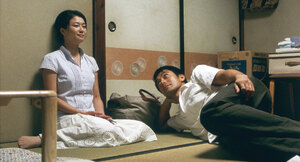Foreign film depicts an honest, intimate portrait of family life
F. Scott Fitzgerald once famously said, “Family quarrels are bitter things. They don’t go according to any rules. They’re more like splits in the skin that won’t heal because there’s not enough material.”
Still Walking, the new film by the modern Japanese master Hirokazu Kore-eda, is about just that kind of wound, the sort that springs from the dysfunction that boils just beneath the surface of a traditional family.

Private lives · The Japanese film Still Walking explores the dysfunctional lives of a large family over a 24-hour period. Directed by Hirokazu Kore-eda, this quiet, nuanced film has won numerous awards at festivals. - Photos courtesy of IFC Films
The film details a 24-hour period in the lives of a large Japanese family. Elderly patriarch Kyohei (Yoshio Harada), a taciturn retired doctor, presides over a reunion of his grown children and their own families. Naturally, old wounds are reopened and bitter words are exchanged.
Kore-eda, whose incomparable works range from the ethereal (Maboroshi) to the starkly real (Nobody Knows), invites inevitable connections between Still Walking and the work of Yasujiro Ozu, whose classic Tokyo Story is widely considered one of the best cinematic meditations on dysfunction and death.
Kore-eda’s earlier films kept their characters, who often occupy a bleak modern landscape, at a physical and emotional distance. Still Walking springs from the memories of Kore-eda’s own family life, and because of this the film has an honest, personal feel — something like an Ozu work.
Refreshingly, Kore-eda’s vision of dysfunction springs from the little cracks in the familial edifice that deepen drastically over lifetimes, rather than from the all-too-typical Wes Anderson style of grinding two unrealistically quirky personalities against one another. Watching the tiny clashes between bitter family members becomes painful in its reality, especially because Kore-eda pushes the audience forcefully into the lives of his characters.
At the core of Still Walking stands Hiroshi Abe as the son, Ryota, a character implicitly based on the filmmaker. The lanky, physically uncomfortable Ryota lives in the shadow of his dead brother, a local hero who had intended, unlike Ryota, to follow in his father’s footsteps as a doctor. Abe slowly-and-steadily builds the frustration Ryota feels wallowing in this shadow into a rage that explodes in the film’s most emotionally potent — and most satisfying — moment. Abe delivers a towering performance that unites the disparate relationships within the film.
It is to the director’s credit, however, that despite Ryota’s explosion at the film’s midpoint, Still Walking never again ventures into the realm of passionate melodrama. Kore-eda allows himself and the audience this one moment of release before everything is returned to the status quo that defines the film: a quiet bitterness that permeates — but does not control — almost every conversation. The slow pace and character-driven conversations allow the film to reveal itself carefully; characters are transformed by their words and actions over the course of the reunion.
Like Ozu with his great personal dramas, Kore-eda is never content to simply allow his images to wilt in the face of his excellent performers. The house that the film occupies becomes a character all its own and Kore-eda beautifully alternates between moments full of life and movement to visually empty scenes of off-screen dialogue or quiet contemplation. The way Kore-eda shoots the house and the people moving within it becomes an allegory for the frustrating, schismatic nature of family — a dynamic alternating between joy and sorrow, life and death.
Still Walking is almost never enjoyable as a work of entertainment, yet it has strong potential to resonate with anyone, dysfunctional family or not. Kore-eda fills his screen with enough realistic family unit types to create resonance within most viewers. Even grandmother Toshiko, who is about as vindictive as possible without veering into “wicked stepmother” territory, will inspire empathy in mothers who have buried their children.
The film misfires, however, in its tepid, overdrawn conclusion. Kore-eda strives too hard to make his messages about dysfunction and death obvious by including some previously unheard narration from Ryota. These scenes can be forgiven, yet Kore-eda should know better than to doubt the subtle potency of his actors and his writing.
The title of the movie comes from a ’70s Japanese pop song that Toshiko keeps as a subtle reminder of a dark time in her life. The song is an emblem of her bitterness, yet the lyric Kore-eda chose for his film’s title is more appropriate as a symbol for the director’s tragic realization of the inevitable progress of life.
About his film, he explains, “As an ungrateful eldest son who used the demands of his profession to excuse my long absences from home, I find myself troubled by regrets to this day.”
Family can be a bitter, unpleasant thing, but losing that bond is truly tragic.
